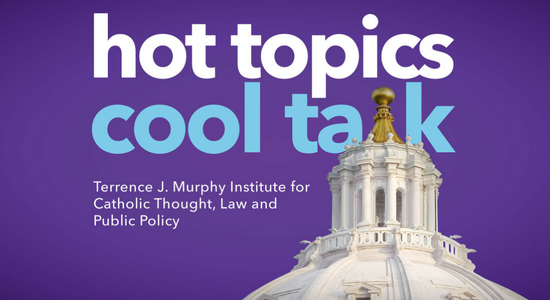Qualified Immunity: What is It? And is It Good or Bad Law and Policy?

Featuring Professor Gregory Sisk, University of St. Thomas School of Law and Professor Christopher Walker, University of Michigan School of Law
Date & Time:
12:30 PM - 1:25 PM
Admission:
Location:
MSL 235 + Livestream
*We apologize for the poor audio quality of this recording. A techinal error took place with the audio equipment during the program which was not able to be resolved at the time of recording. We hope access to the presented slides will still prove useful. Thank you for your understanding.
In recent years, members of the Supreme Court, judges on several courts, policymakers, and scholars across the ideological spectrum have argued it is time to revisit or eliminate qualified immunity.
When a civil rights lawsuit is brought against a government officer for money damages, qualified immunity provides a defense for the government employee who by reasonable mistake may have infringed a constitutional right. The argument for official immunity arises both as a matter of fairness to a government employee who was faithfully carrying out a government directive or acting in a fast-changing and volatile situation and because the prospect of liability might chill creative administration and effective law enforcement. On the other hand, when qualified immunity is granted to a government officer who has crossed the constitutional line, even if that officer complains that the line was not previously well-marked, the victims of constitu¬tional wrongdoing may be left without a remedy.
The crucial inquiry for qualified immunity is whether the officer violated clearly established rights of which a reasonable official would have known. As the doctrine has evolved, the Supreme Court defines what is reasonable by whether prior court precedents provided clear notice as to what the Constitution demands when applied in a specific context.
As part of the "Hot Topic: Cool Talk" series, this program will feature two legal scholars with contrasting views on the legal and policy merits of qualified immunity participating in spirited yet civil conversation.
Speakers
Professor Gregory C. Sisk, University of St. Thomas School of Law
After law school, Gregory Sisk entered into public service, serving in all three branches of the federal government: legislative assistant to a United States Senator, law clerk to a judge on the United States Court of Appeals for the Ninth Circuit, and appellate specialist with the United States Department of Justice. Subsequent to government service, he was the head of the appellate department for a Seattle law firm. As an appellate attorney, Sisk has handled appeals cases before ten of the thirteen federal courts of appeals and several state appellate courts. Sisk joined the faculty of the Drake University Law School in 1991, where he was appointed the Richard M. & Anita Calkins Distinguished Professor.
Sisk is a nationally-recognized scholar on the subjects of civil litigation with the federal government and empirical (statistical) analysis of judicial decision making; he also writes about federal courts, legal ethics, and constitutional law. He is the author of the casebook, “Litigation With the Federal Government,” which is published by Foundation Press, and a treatise by the same name, which is published by ALI-ABA. Sisk’s empirical work on court decisions was honored with the Article Prize from the Law and Society Association in 1999.
He has remained an active member of the practicing bar, primarily in appellate litigation and as an expert witness or consultant on legal ethics. In recent years, he has briefed cases before the U.S. Supreme Court on civil suits against the federal government and jurisdiction in the Court of Federal Claims. He served as reporter for the Iowa Rules of Professional Conduct Drafting Committee appointed by the Iowa Supreme Court to draft the new set of ethics rules to govern lawyers in Iowa. Sisk also is an elected member of the American Law Institute.
Professor Christopher J. Walker, University of Michigan School of Law
Prior to joining Michigan law faculty in 2022, Professor Walker spent a decade teaching at The Ohio State University Moritz College of Law. He previously clerked for Justice Anthony Kennedy of the U.S. Supreme Court, worked on the Civil Appellate Staff at the U.S. Department of Justice, and served on the Senate Judiciary Committee staff for the Gorsuch Supreme Court confirmation. Professor Walker’s research focuses on administrative law, regulation, and law and policy at the agency level. His publications have appeared in the California Law Review, Duke Law Journal, Georgetown Law Journal, Michigan Law Review, Stanford Law Review, and University of Pennsylvania Law Review, among others. His book Constraining Bureaucracy Beyond Judicial Review is forthcoming with Cambridge University Press. Outside the law school, he chaired the American Bar Association’s Section of Administrative Law and Regulatory Practice in 2020-21 and served as one of forty Public Members of the Administrative Conference of the United States from 2016-2022, and he continues to serve in both organizations in various capacities. He blogs regularly at the Yale Journal on Regulation.
COVID
In the interests of protecting our community, we strongly urge all guests of the university to be fully vaccinated before visiting our campus and face masks are required to be worn in all classrooms. To view all current COVID policies and procedures in place on-campus, please visit the university's guest page.